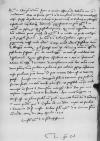Mox, ut cf. Ioannes DANTISCUS to Tiedemann GIESE Heilsberg (Lidzbark Warmiński), 1539-04-12, CIDTC IDL 2132⌊sententiamcf. Ioannes DANTISCUS to Tiedemann GIESE Heilsberg (Lidzbark Warmiński), 1539-04-12, CIDTC IDL 2132⌋ Reverendissimae Dominationis Vestrae de translatione comitiorum Marienburg (Malbork), town and castle in northern Poland, Pomeranian Voivodeship, on the Nogat river, a branch of the Vistula at its delta, the capital of the Grand Masters of the Teutonic Order in Prussia (1309-1457), a voivodeship capital in Royal Prussia, which belonged to the Kingdom of Poland (1466-1772). Marienburg (taking turns with Graudenz (Grudziądz)) was the venue for the Provincial Diets of Royal Prussia, which were chaired by the bishop of Ermland (Warmia)⌊MarieburgensiumMarienburg (Malbork), town and castle in northern Poland, Pomeranian Voivodeship, on the Nogat river, a branch of the Vistula at its delta, the capital of the Grand Masters of the Teutonic Order in Prussia (1309-1457), a voivodeship capital in Royal Prussia, which belonged to the Kingdom of Poland (1466-1772). Marienburg (taking turns with Graudenz (Grudziądz)) was the venue for the Provincial Diets of Royal Prussia, which were chaired by the bishop of Ermland (Warmia)⌋ accepi, scripsi ad palatinos Johann von Lusian (Jan Luzjański) (*before 1470 – †1551), brother of Fabian von Lusian (Luzjański), Bishop of Ermland (Warmia); 1514-1551 Voivode of Kulm (Chełmno); 1520-1525 Burgrave of Rössel (Reszel) (PSB 18, p. 166-167)⌊CulmensemJohann von Lusian (Jan Luzjański) (*before 1470 – †1551), brother of Fabian von Lusian (Luzjański), Bishop of Ermland (Warmia); 1514-1551 Voivode of Kulm (Chełmno); 1520-1525 Burgrave of Rössel (Reszel) (PSB 18, p. 166-167)⌋ et Jerzy Konopacki Sr (Georg von Konopat) (*ca. 1480 – †1543), brother of Jan Konopacki, Bishop of Kulm (Chełmno); 1512-1516 Chamberlain of Pomerania; 1516-1518 Castellan of Gdańsk (Danzig); 1518-1543 Voivode of Pomerania (PSB 13, p. 547-548)⌊PomeraniensemJerzy Konopacki Sr (Georg von Konopat) (*ca. 1480 – †1543), brother of Jan Konopacki, Bishop of Kulm (Chełmno); 1512-1516 Chamberlain of Pomerania; 1516-1518 Castellan of Gdańsk (Danzig); 1518-1543 Voivode of Pomerania (PSB 13, p. 547-548)⌋ ac Mikołaj Działyński (Nikolaus von Dzialin) (†1545), from 1507 royal courtier; 1510-1528 Chamberlain of Dobrzyń; 1528-1544 Castellan of Kulm (Chełmno); 1544-1545 Voivode of Pomerania; Starosta of Bratian, Strasburg in Preussen (Brodnica), and Dobrzyń (PSB 6, p. 92-94; Urzędnicy 5/2, p. 204)⌊CulmensemMikołaj Działyński (Nikolaus von Dzialin) (†1545), from 1507 royal courtier; 1510-1528 Chamberlain of Dobrzyń; 1528-1544 Castellan of Kulm (Chełmno); 1544-1545 Voivode of Pomerania; Starosta of Bratian, Strasburg in Preussen (Brodnica), and Dobrzyń (PSB 6, p. 92-94; Urzędnicy 5/2, p. 204)⌋ ac Ludwig von Mortangen (Ludwik Mortęski) (†1539), 1512-1516 Castellan of Gdańsk (Danzig); 1516-1539 Castellan of Elbing (Elbląg) (SBPN 3, p. 256-257; PSB 22 Morsztyn Zbigniew - Mytkowicz, p. 9-11)⌊ElbingensemLudwig von Mortangen (Ludwik Mortęski) (†1539), 1512-1516 Castellan of Gdańsk (Danzig); 1516-1539 Castellan of Elbing (Elbląg) (SBPN 3, p. 256-257; PSB 22 Morsztyn Zbigniew - Mytkowicz, p. 9-11)⌋ castellanos Thorn Town Council ⌊consulatumque ThorunensemThorn Town Council ⌋ significans me sententiae Reverendissimae Dominationis Vestrae accedere ac ipsorum quoque postulans sententiam. Qui omnes responderunt litteris redditis, quas praesentibus ad Reverendissimam Dominationem Vestram mitto, ex quibus intelliget, quid singuli sentiant. In litteris domini Johann von Lusian (Jan Luzjański) (*before 1470 – †1551), brother of Fabian von Lusian (Luzjański), Bishop of Ermland (Warmia); 1514-1551 Voivode of Kulm (Chełmno); 1520-1525 Burgrave of Rössel (Reszel) (PSB 18, p. 166-167)⌊Culmensis palatiniJohann von Lusian (Jan Luzjański) (*before 1470 – †1551), brother of Fabian von Lusian (Luzjański), Bishop of Ermland (Warmia); 1514-1551 Voivode of Kulm (Chełmno); 1520-1525 Burgrave of Rössel (Reszel) (PSB 18, p. 166-167)⌋ nescio quid pugnantiae inesse mihi videtur. Ceterum omnes videntur fastidire locum Elbing (Elbląg), city in northern Poland, Pomerania, on the Vistula Lagoon, one of the three Great Prussian Cities (beside Gdańsk (Danzig) and Thorn (Toruń)) which had representatives in the Prussian Council; member of the Hanseatic League⌊Elbingensis civitatisElbing (Elbląg), city in northern Poland, Pomerania, on the Vistula Lagoon, one of the three Great Prussian Cities (beside Gdańsk (Danzig) and Thorn (Toruń)) which had representatives in the Prussian Council; member of the Hanseatic League⌋, quem — fortasse verum est — non minus etiamnum esse de pestilentia suspectum quam Marienburg (Malbork), town and castle in northern Poland, Pomeranian Voivodeship, on the Nogat river, a branch of the Vistula at its delta, the capital of the Grand Masters of the Teutonic Order in Prussia (1309-1457), a voivodeship capital in Royal Prussia, which belonged to the Kingdom of Poland (1466-1772). Marienburg (taking turns with Graudenz (Grudziądz)) was the venue for the Provincial Diets of Royal Prussia, which were chaired by the bishop of Ermland (Warmia)⌊MarieburgumMarienburg (Malbork), town and castle in northern Poland, Pomeranian Voivodeship, on the Nogat river, a branch of the Vistula at its delta, the capital of the Grand Masters of the Teutonic Order in Prussia (1309-1457), a voivodeship capital in Royal Prussia, which belonged to the Kingdom of Poland (1466-1772). Marienburg (taking turns with Graudenz (Grudziądz)) was the venue for the Provincial Diets of Royal Prussia, which were chaired by the bishop of Ermland (Warmia)⌋, et certum est nobilitati toti displiciturum. Quare esset forte consultius, ut a Sigismund I Jagiellon (Zygmunt I) (*1467 – †1548), King of Poland and Grand Duke of Lithuania (1506-1548); Duke of Głogów (Glogau) (1499-1506), Duke of Opava (1501-1506), Governor of Silesia (1504-1506); son of King Kazimierz IV Jagiellon and Elisabeth of Austria⌊maiestate regiaSigismund I Jagiellon (Zygmunt I) (*1467 – †1548), King of Poland and Grand Duke of Lithuania (1506-1548); Duke of Głogów (Glogau) (1499-1506), Duke of Opava (1501-1506), Governor of Silesia (1504-1506); son of King Kazimierz IV Jagiellon and Elisabeth of Austria⌋ impetraretur dilatio tamen usque Trinitatis[1], de translatione autem loci maiestas eius daret potestatem dominis praelatis et palatinis pro arbitrio ipsorum constituere visa qualitate praesenti locorum etc., quae incerta adhuc est et variari potest.
Invasit me in Althausen (Starogród, Antiquum Castrum), town on the Vistula river, ca. 1.5 km S of Kulm, initial location of Kulm; given to the Kulm cathedral by Alexander Jagiellon, it was the summer residence of the Kulm bishops⌊StarigrodAlthausen (Starogród, Antiquum Castrum), town on the Vistula river, ca. 1.5 km S of Kulm, initial location of Kulm; given to the Kulm cathedral by Alexander Jagiellon, it was the summer residence of the Kulm bishops⌋ febris tertiana, quae subinde senior facta, me totum viribus exhausit, ut possibile non sit mihi comitiis ad ferias Sancti Stanislai[2] interesse. Domino Deo, qui me visitare dignatur, laus et benedictio, hic meus languor in causa est, ut plura scribere non queam.
Remitto cf. Dietrich von RHEDEN to Ioannes DANTISCUS Rome, 1538-11-23, CIDTC IDL 5639⌊litterascf. Dietrich von RHEDEN to Ioannes DANTISCUS Rome, 1538-11-23, CIDTC IDL 5639⌋ domini Dietrich von Rheden (Teodoryk Reden) (*1492 – †1556), doctor of both canon and civil law. Rheden spent most of his life in Rome where he was dealing with, among other things, the affairs of the Ermland Chapter; 1532-1551 Canon of Ermland (Warmia); Canon of Mainz and Lübeck; in 1551 he was appointed Bishop of Lübeck, but he did not accept the dignity (KOPICZKO 2, p. 263; SBKW, p. 200)⌊TheodericiDietrich von Rheden (Teodoryk Reden) (*1492 – †1556), doctor of both canon and civil law. Rheden spent most of his life in Rome where he was dealing with, among other things, the affairs of the Ermland Chapter; 1532-1551 Canon of Ermland (Warmia); Canon of Mainz and Lübeck; in 1551 he was appointed Bishop of Lübeck, but he did not accept the dignity (KOPICZKO 2, p. 263; SBKW, p. 200)⌋ et nova quaedam, quae dominus Stanisław Kostka (*1487 – †1555), as a leader of the so-called nobles' party active in Royal Prussia since 1536, Kostka stood in opposition to most of the members of the Council of Royal Prussia, who wanted to maintain the autonomy of the province and a "balance of power" in terms of governance. The tension between the Prussian Subtreasurer and the Council had been increasing since the Diet in Graudenz (Grudziądz) in 1533. Kostka, connected with the royal court since his youth, was sent to Graudenz as the King's deputy and, contrary to custom, decided to take part in the proceedings. In response to such a step, the Council members stopped the meeting. Kostka accused them of hostility towards the Poles and intervened on this matter at the court. In the absence of the then Bishop of Ermland (Mauritius Ferber) it was Dantiscus who chaired the Graudenz Diet. The incident badly harmed his future relationships with Kostka; 1531-1555 Treasurer of the Prussian lands and Treasurer of Marienburg (Malbork); 1544-1545 Castellan of Elbing (Elbląg), 1545-1546 Castellan of Kulm (Chełmno); 1546-1549 Vice-Voivode of Kulm; 1546-1551 Voivode of Pomerania; 1551-1555 Voivode of Kulm (PSB 14, p. 356; Urzędnicy 5/2, p. 216; MAŁŁEK 1976, p. 119-123)⌊CoskaStanisław Kostka (*1487 – †1555), as a leader of the so-called nobles' party active in Royal Prussia since 1536, Kostka stood in opposition to most of the members of the Council of Royal Prussia, who wanted to maintain the autonomy of the province and a "balance of power" in terms of governance. The tension between the Prussian Subtreasurer and the Council had been increasing since the Diet in Graudenz (Grudziądz) in 1533. Kostka, connected with the royal court since his youth, was sent to Graudenz as the King's deputy and, contrary to custom, decided to take part in the proceedings. In response to such a step, the Council members stopped the meeting. Kostka accused them of hostility towards the Poles and intervened on this matter at the court. In the absence of the then Bishop of Ermland (Mauritius Ferber) it was Dantiscus who chaired the Graudenz Diet. The incident badly harmed his future relationships with Kostka; 1531-1555 Treasurer of the Prussian lands and Treasurer of Marienburg (Malbork); 1544-1545 Castellan of Elbing (Elbląg), 1545-1546 Castellan of Kulm (Chełmno); 1546-1549 Vice-Voivode of Kulm; 1546-1551 Voivode of Pomerania; 1551-1555 Voivode of Kulm (PSB 14, p. 356; Urzędnicy 5/2, p. 216; MAŁŁEK 1976, p. 119-123)⌋ ad me dedit, nuper, ut scribit, e Cracow (Kraków, Cracovia), city in southern Poland, Małopolska, on the Vistula river, from 1038 capital of the Kingdom of Poland⌊CracoviaCracow (Kraków, Cracovia), city in southern Poland, Małopolska, on the Vistula river, from 1038 capital of the Kingdom of Poland⌋ ad se missa.
Valeat feliciter Reverendissima Dominatio Vestra, cui me fraterne commendo.


 AAWO, AB., D. 2, f. 106v
AAWO, AB., D. 2, f. 106v